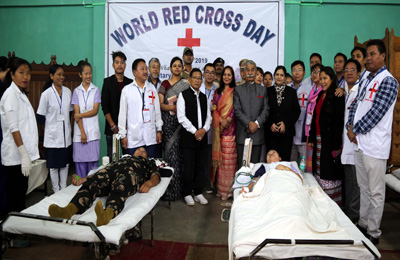103 individuals donate blood
ITANAGAR, May 8: Governor of Arunachal Pradesh Dr BD Mishra participated in the World Red Cross Day commemoration here at the Raj Bhavan on Wednesday.
A blood donation platform was organized on the occasion by the Indian Red Cross Society (IRCS), Arunachal Pradesh branch in collaboration with the Raj Bhavan, the Ramakrishna Mission Hospital and the Tomo Riba Institute of Health and Medical Science (TRIHMS).
The governor, who is the president of the Arunachal Pradesh branch of the IRCS, said that World Red Cross Day is observed on the birthday of Henry Dunant, founder of the Red Cross Society, to emulate his ideals of self-service to the society.
He appealed to the people of the state, particularly the youth and students to voluntarily donate blood and save the life of needy people. He also urged upon the citizens to emulate the lofty values of the Magen David Adom volunteers in service of their people.
Mishra, who is also member of the governing body of All Indian Red Cross Society, requested Dr Vanshree Singh, Director of the Blood Bank, Indian Red Cross Society, National Headquarters, New Delhi and the Director of TRIHMS to make the blood bank facilities fully functional and beneficial for every needy person.
Dr Vanshree Singh, Dr Emi Rumi, hony secretary, Indian Red Cross Society, Arunachal Pradesh and Ramesh Jeke, president, Junior Red Cross, Arunachal Pradesh also addressed the gathering on the occasion.
Earlier, two blood recipients BD Anna and Geto Ngomdir, along with blood donors Aini Taloh, Hage Angkha and Hillang Bharat shared their experiences and highlighted the significance of blood donation.
As a part of commemorating World Red Cross Day, a blood donation camp was conducted during the day at the Raj Bhavan.
Out of the 120 volunteers, 103 individuals donated blood, which included 10 women.
Senior Medical Officer of the Raj Bhavan Dispensary, Dr Jennifer Tayeng informed that 29 units of blood collected were ‘A’ positive, 31 units were ‘B’ positive, 10 units were ‘AB’ positive, 31 units were ‘O’ positive and two units were ‘AB’ negative.
The SMO pointed that as negative blood group are very rare and difficult to get, out of the 6 (Rh) negative volunteers, only two donated blood on the day. Other four volunteers were kept as standby for emergency cases.
A large number of volunteers, including personnel from NDRF, ITBP, CRPF and state police and NCC, NSS, scouts and guides, students from colleges and university, NGOs, government officials, and the public turned up to donate blood. (PRO to Raj Bhavan)



